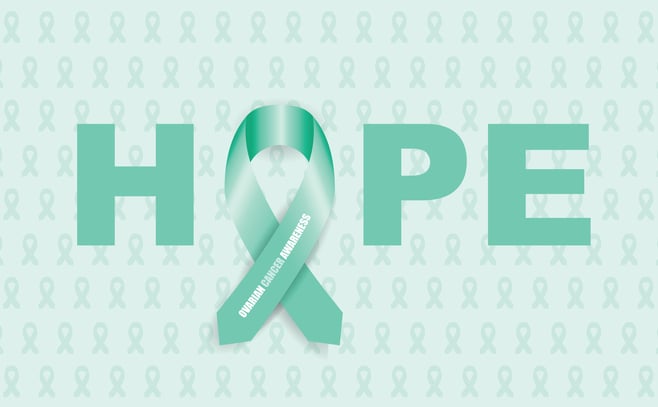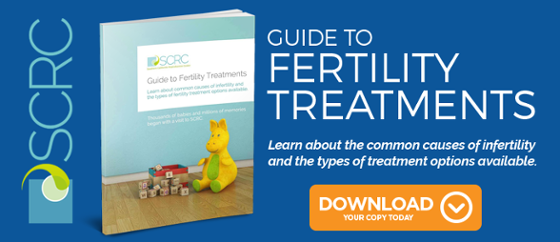
September is National Ovarian Cancer Awareness Month. The American Cancer Society estimates that about 22,440 women in the United States will receive a new ovarian cancer diagnosis this year. While ovarian cancer primarily affects older women (about half of those diagnosed are over 63 years old) it can also strike young women at any point in their fertile years.
An ovarian cancer diagnosis is likely to bring up a huge range of emotions, and in the immediate aftermath, questions about future fertility come after concerns about survival rates and treatment options.
For thousands of women, however, both the cancer itself and the treatments used to combat it have severe consequences for their ability to conceive a child after treatment. It is a conversation which should be had sooner rather than later, however, because for many patients, the window for viable fertility preservation options may be measured in weeks.
How does ovarian cancer affect fertility?
All cancers can end up negatively impacting fertility, because chemotherapy drugs and radiation can damage the reproductive organs. In the case of a reproductive cancer such as ovarian cancer, there is a chance that treatment may also involve removal of part or all of the reproductive organs: both ovaries, fallopian tubes, and uterus. With such drastic surgery, survivors may need to look to other options such as adoption or surrogacy with a donor egg, in order to build their families.
If the cancer is caught early and only one ovary is affected, it may be possible to preserve the healthy ovary and uterus. In this case, you may be able to get pregnant after treatment with the help of IVF.
What can be done to preserve my fertility?
Fertility preservation can be a complicated subject when it comes to ovarian cancer, because it is the ovaries themselves which are affected. Whether it is an option for you is something that will need to be discussed early with both your oncologist and a reproductive endocrinologist. What stage your cancer has reached, whether one or both ovaries are affected, and how quickly treatment must begin are all factors. The first priority must be your own treatment and recovery.
Egg and embryo freezing
Egg freezing is the most common type of fertility preservation treatment for cancer patients. The process involves taking fertility drugs for about two weeks to stimulate egg production in the ovaries, and then visiting the fertility clinic for an egg retrieval procedure performed under light sedation. By retrieving and storing the eggs, they are protected from the adverse effects of many cancer treatments such as chemo or radiation and they can be used after recovery to attempt IVF yourself or with a surrogate.
In the case of ovarian cancer, egg freezing is not always recommended. There can be some concern over whether there is enough time for an egg-freezing cycle before treatment. There can also be a question of whether the fertility medications used to stimulate the ovaries could also cause the cancer to grow more rapidly. If your oncologist does give you the go-ahead and eggs are successfully retrieved, and if you are in a partnership, you may wish to fertilize some or all of the eggs so that you can freeze embryos, which gives you the best chance of pregnancy after recovery.
Ovarian tissue transplant
A relatively new option for cancer patients is the ovarian tissue transplant, where ovarian tissue is removed before cancer treatment and frozen. After recovery, the tissue can be transplanted back into the patient to produce new eggs which can be used for IVF. This option has the benefit of not requiring ovarian stimulation, and results over the past ten years have been encouraging.
A recent small study in Denmark, published in the journal Human Reproduction looked at 41 patients who had undergone the procedure in the last decade. It found that 10 of the 32 women who wanted to become pregnant had been able to have a baby, and none of the women had a cancer recurrence as a result of the transplant. Whether ovarian tissue transplant is an option for ovarian cancer patients is controversial (there is a fear that the transplant could reintroduce cancer cells to the body,) and whether it is possible at all will depend on the health of the ovaries, but it is an interesting new development that may be worth exploring.
If you or someone you love has recently been diagnosed with ovarian cancer, it is important to know that there is support out there. You are not alone in this struggle. Above all, remember to reach out for information and support from your medical team, and don’t wait to find out what your options are.
For those who want to look into fertility preservation before treatment, advice and financial support is available from foundations such as Team Maggie, The Heart Beat Program, and The Livestrong Foundation. SCRC is a proud LIVESTRONG Fertility program partner, offering discounted fertility services to cancer patients and survivors. We are also partners with the Cancer Warrior Foundation, empowering young women with reproductive cancers throughout their treatment with financial resources and community support. If you would like to speak with one of our fertility experts to discuss fertility preservation, please don’t hesitate to schedule a consultation.
Share this on social media:





